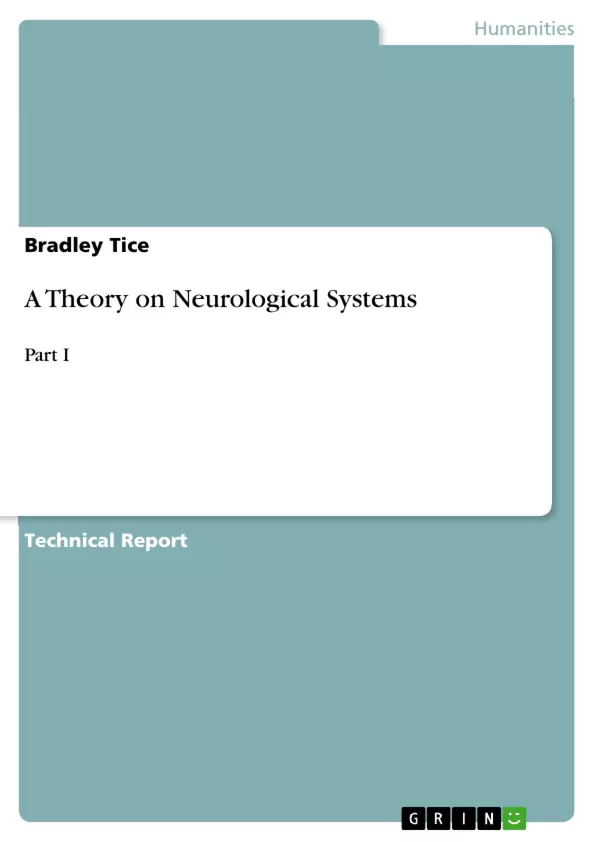The technical paper will focus on three areas of Artificial Intelligence:
1. The Turing model of intelligence in machines.
2. Godel's Theorem and numbers.
3. Organic and non-organic systems.
The paper concludes with some re-evaluations on the traditional notions found in the scientific literature on these three areas of AI.
Inhaltsverzeichnis (Table of Contents)
- Introduction
- Part I
- Part II
- Part III
- Summary
Zielsetzung und Themenschwerpunkte (Objectives and Key Themes)
This technical report aims to revisit arguments raised by Penrose concerning Artificial Intelligence and propose a new model of neurological systems. The report focuses on three key areas: the Turing model of intelligence, Gödel's Theorem and numbers, and organic and non-organic systems.
- The limitations of the Turing Test as a measure of machine intelligence
- The interpretation and application of Gödel's Theorem in understanding human thought processes
- The potential for organic systems to inform the design of reliable, robust non-organic systems
- The concept of "error" as an essential element of system function
- The implications of intractable algorithms for the reliability of systems
Zusammenfassung der Kapitel (Chapter Summaries)
Introduction: This section introduces the report's objective to re-examine Penrose's arguments regarding Artificial Intelligence and presents the three key areas of focus.
Part I: This section examines the Turing Test of machine intelligence, arguing that it is primarily a linguistic test and not a true measure of intellect. The author discusses the limitations of the Turing Test, including the influence of extraneous factors such as language and cultural knowledge, and proposes that real intelligence extends beyond a simple game.
Part II: This section explores Penrose's use of Gödel's Theorem as a "proof" that mathematical insight is non-algorithmic. The author challenges this interpretation, arguing that Gödel's Theorem does not inherently imply that human thought is non-algorithmic. The section delves into the axiomatic foundations of number theory and presents a modified interpretation of Gödel's Incompleteness Theorem.
Part III: This section examines von Neumann's work on reliable systems, highlighting the importance of "error" as an integral part of system function. The author draws parallels between von Neumann's synthetic systems and organic systems, suggesting that the concept of "error" can be applied to both. This section explores the potential for problematic algorithms to be treated as "errors" within a system and replaced by functional ones.
Summary: This section summarizes the main points of the report, reiterating the limitations of the Turing Test, the nuanced interpretation of Gödel's Theorem, and the potential for organic systems to guide the design of reliable non-organic systems. It emphasizes the importance of functional algorithms and the role of "error" in system function.
Schlüsselwörter (Keywords)
This technical report explores key concepts related to Artificial Intelligence, neurological systems, and system reliability. Key terms include Turing Test, Gödel's Theorem, axiomatic systems, algorithmic function, organic systems, non-organic systems, error, and reliability. The report examines the limitations of current models of intelligence and proposes a new model of neurological systems based on a nuanced understanding of these concepts.
Frequently Asked Questions
What is the Turing model of intelligence?
The Turing model, often associated with the Turing Test, evaluates machine intelligence based on its ability to mimic human linguistic behavior.
How does Gödel's Theorem apply to AI?
Gödel's Theorem is often used to argue that human mathematical insight is non-algorithmic, suggesting limits to what machines can "know" or prove.
What is the difference between organic and non-organic systems in this paper?
The paper explores how organic systems handle "errors" as functional elements and how this can inform the design of robust non-organic artificial systems.
Is the Turing Test a true measure of intellect?
The author argues that it is primarily a linguistic and cultural test rather than a definitive measure of true intellectual capacity.
What role does "error" play in system function?
The paper suggests that error is an essential element of system reliability, drawing on von Neumann's work to show how systems can manage problematic algorithms.
- Citation du texte
- Professor Bradley Tice (Auteur), 2005, A Theory on Neurological Systems, Munich, GRIN Verlag, https://www.grin.com/document/206681



